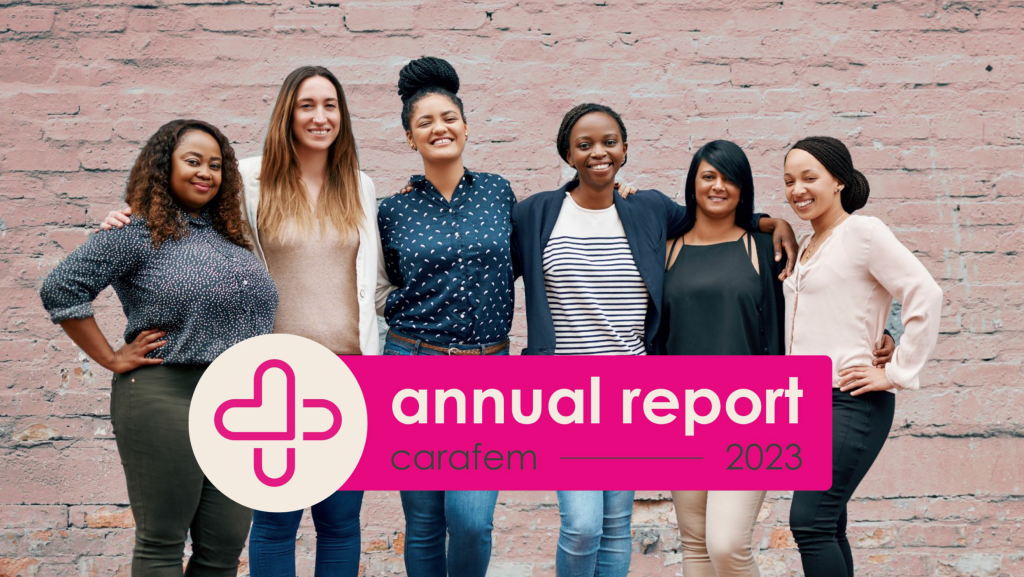
Even though the abortion pill (aka medication or medical abortion) has been FDA approved for over 20 years and is 98% effective, there is still a lot of misinformation and anxiety around if it works. Don’t worry – carafem is always here to help you navigate through any abortion pill side effects!
Are you curious about what actually happens when you take the abortion pill? Or how someone would know the abortion is complete? Check out some questions we frequently hear to know what to expect if you or a friend is taking the abortion pill.
1. What happens when you take the abortion pill?
The abortion pill is actually a combination of what is usually two kinds of pills (mifepristone and misoprostol) that are taken in sequence. In the U.S. these are most often used before 11 weeks of pregnancy.
The first pill, mifepristone, blocks a hormone necessary for a pregnancy to continue to develop. Most people swallow this first pill in our office. A small number of people see some vaginal bleeding after taking mifepristone, but it’s not common.
The second pill, misoprostol, causes cramping and bleeding from the vagina so that the pregnancy will leave your body (similar to a miscarriage). It is usually taken at home within 72 hours after taking the first pill.
Most people start to see cramping and bleeding within about an hour after taking the misoprostol, though some take longer. It’s normal to feel chills, nausea or even have diarrhea along with bleeding and cramping while your body is pushing the pregnancy from your uterus.
It’s kind of like having a really heavy, crampy period along with mild flu-like symptoms. It is good to have some thick overnite type maxi pads ready along with a heating pad to help with cramping. carafem provides anti-nausea and pain medication to help handle these symptoms.
For most people, the heaviest bleeding and cramping ends once the pregnancy has passed, usually within 3-4 hours. It is important to plan for possible vaginal bleeding to continue after any type of abortion. Some see light bleeding that lasts up until their next period starts, which is usually within about 4-6 weeks.
2. What should I expect after the abortion is complete?
How you feel during and after a medication abortion varies from person to person. You may feel tired or crampy for a day or so, and you’ll have bleeding and spotting for a while. Most people go back to normal activities a day or two after a medication abortion.
You can go back to work, school, driving, and most other normal activities the next day if you feel up to it. You may want to lay off on hard work or heavy exercise for a few days, so pay attention to how you are feeling and make sure to eat nutritious food and get plenty of fluids until you feel back to normal.
The good news is that most of the symptoms of pregnancy, like nausea and tiredness, get much better or even go away within as little as 48 hours.
3. How do you know if the abortion pill worked?
First, it is important to understand that having an abortion with medication is a process, and everyone’s body reacts differently. It takes time for the uterus to empty and for the abortion to be complete. Cramping means that your uterus is contracting, and is actually a good sign that the medication is working. It is normal for the bleeding and clotting to continue for 1 to 3 weeks or even longer.
If you know you had bleeding and passed some blood clots, that is a good indication that the medicine is working. Relief from symptoms of pregnancy is a good sign as well.
An abortion with medications is very effective and fails less in less than 2% of all cases but in order to know for sure the abortion is complete, you can return to our office for a follow-up visit.
You can also take a home pregnancy test, but it’s good to remember a urine test will often still show a positive result for several weeks. It is suggested that you wait for at least 3 weeks before taking a home pregnancy test.
4. How does taking the abortion pill affect my body?
Despite some of the misinformation out there, taking the abortion pill will not have any long-term effects on your body. In fact, most people feel physically fine shortly after an abortion. Some people feel like they can return to everyday activities right away, and others need more rest (no one’s judging you when you click “Keep Watching” on Netflix — trust us!).
Many people have light bleeding or spotting for up to a couple of weeks or so after their abortion. You may want to avoid heavy physical activity or exerting yourself too much during that time until your bleeding has stopped. Eating healthy food and staying hydrated can help too. You should plan to do what your body tells you to do.
Important to note, taking the abortion pill will not increase your risk for breast cancer or affect your fertility. Abortion is very safe and doesn’t cause problems with future pregnancies and doesn’t negatively impact your physical or mental health. These are common myths that are not backed by medical evidence.
5. Are there any abortion pill side effects?
Bleeding and cramping are normal during a medication abortion and are signs that the medicines are working. The day you take your second set of pills, you may want to take some time off work or school so you can be as comfortable as possible.
Many people want to be close to a private bathroom as the effects of the medication may include heavy bleeding and diarrhea. Some people also prefer to take the second set of medications in the evening after others at home have gone to bed for additional privacy.
During your abortion, you will likely see some blood clots, which is normal — as long as they are no bigger than a lemon. Other side effects may include nausea, chills, diarrhea, a slight increase in temperature, and some dizziness. Your clinician will give you medication to help you manage these effects and keep you comfortable. A heating pad or hot water bottle helps a lot.
Most people do just fine.
6. How does an abortion feel? Physically and mentally?
The big question that everyone wants to know about abortion pill side effects is, does an abortion hurt? We wish we could give you a definitive answer but the truth is that having an abortion feels different for everybody — just like how periods are different for everybody.
It can be painful or just a little uncomfortable. Everyone reacts differently. Thousands of people have successfully used this method of abortion for the last 20 years. Your carafem health care team can help you to feel prepared to better handle this experience.
For most people, medication abortion physically feels like having an early miscarriage or a heavy period with mild flu-like symptoms. You could have cramping and aches in your belly, heavy bleeding with large blood clots, an upset stomach or vomiting, diarrhea, dizziness, tiredness, and mild fever (99-100° F) or chills on the day you take the misoprostol.
When should you call your health center?
If you don’t have any bleeding within 24 hours after taking the second medicine, call your health center to check in about what to do next. Some people respond well after an additional dose of misoprostol. If at any time you have very heavy bleeding or have flu-like symptoms that are getting worse instead of better after 24 hours, call your doctor or health center right away. Don’t worry, carafem will provide pain medication and anti-nausea medication to help you to manage these possible effects.
Don’t forget to take care of your mental health as well!
Mentally, people can have a range of emotions after having an abortion. Most people feel relief, but sometimes people feel sad. You might have a mixture of many emotions. This is totally normal and there isn’t a right or wrong way to feel. If your mood keeps you from doing the things you usually do each day, it’s okay to call a healthcare provider for help.
There are also many organizations that provide confidential emotional support, like Exhale, All-Options, and Connect & Breathe, if you’d like to talk to or text someone about your personal abortion experience.
7. After-abortion care & recovery tips!
Our team put together an excellent guide on after abortion care with symptoms to watch for & helpful abortion recovery tips. Now that you know some of the symptoms you might experience during your abortion, you’ll want to read up on our tips for how to take care of yourself after an abortion. You’ll learn about any lingering symptoms to be aware of, the best self-care tips to make you more comfortable, and we even provide a list of helpful self-care activities complete with our Reproductive Power Jams playlist.



